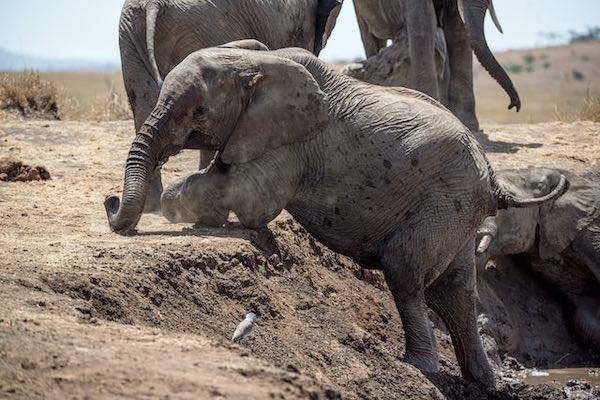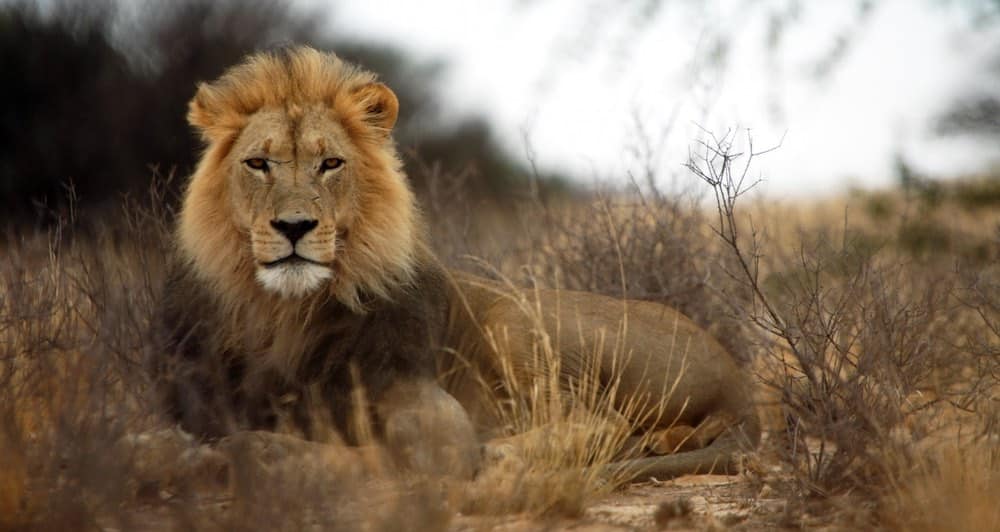In the wild, elephants are cautious creatures that are easily spooked. Even in zoos, elephants have a reputation for acting unpredictably and breaking out of their enclosures.
What exactly are elephants afraid of? Do they have any natural predators? Are there any animals that enjoy preying on them?
Because of their size, there aren’t many animals that pose a threat to elephants. Adult elephants can be targeted by large predators such as lions, tigers, and crocodiles.
However, these attacks are extremely rare since adult elephants tend to live alone or in small groups which makes it difficult for hunters to find them.
When an elephant is young, it is much more vulnerable to attacks from other species.
What are elephants afraid of when they’re young?

Separation from their Mother
As mentioned before, elephants are afraid of many things when they’re young. One of the things that they’re most afraid of is being separated from their mothers.
If an elephant calf becomes separated from its mother, it will often become lost and confused. This is because elephants have a very strong bond with their mothers and rely on them for guidance and protection.
If a calf is separated from its mother or their herd, it will often cry out for her, which can attract predators.
Predators
Elephants have a low survival rate when they’re young. It’s thought that up to 50% of calves don’t make it through their first year.
Another thing that elephants are afraid of when they’re young is predators. Baby elephants are much more vulnerable to attacks from lions, tigers, and other large predators.
This is because they haven’t developed the size and strength to defend themselves from these animals.
When young, a baby elephant is relatively defenceless against predators.
When these predators attack, it increases the elephant’s fear, and the ones with relatively poor eyesight can get startled by anything, even if a mice dart past.
Additionally, young elephants are also more likely to be alone or in small groups, which makes them easier targets for predators.
Being Captured
Another thing that elephants are afraid of is being captured by humans. This is because elephants are often hunted for their ivory tusks, which are highly valuable.
As a result, elephants are often killed for their tusks, which is a major conservation concern.
Additionally, elephants are also captured and sold into the wildlife trade. The trained elephants are used for entertainment or labor. This is an abusive industry that often mistreats and kills elephants.
Recommended reading: Facts about Baby Elephants. Everything you wanted to know about Elephant calves.
Elephants and Predator Behaviour
If a predator has the opportunity to attack an elephant, it is unlikely to be successful. Adult elephants are very tough to kill because of their size, strength and durability.
As mentioned, most attacks will be targeted at young calves. Studies show that lions and tigers prefer to ambush their prey from dense vegetation. This makes it easier for them to hide and sneak up on the elephants.
Pregnant elephants are also vulnerable to attack since they have slower reflexes and are less agile than normal.
As soon as an elephant detects an attack, it will try to escape, but if cornered, it will fight back with its tusks. When elephants are going on the attack, you can often see them charging against their opponent.
Predators that hunt Elephants
Lions and Tigers
Tigers and lions are both known to hunt elephants. Lions prefer to hunt in groups and ambush their prey from a hiding position.
They’re particularly partial to hunting baby elephants and have been known to attack herds of adults in order to get to the young calves.
Tigers tend to stalk their prey and prefer to attack the elephant from behind. They’re into stealth and subtlety.
They also prefer to ambush the baby elephants and will wait for the herd to pass before jumping out and attacking.
Hyenas don’t hunt big elephants very often but when they do, they prefer to attack them from behind, as well. They are fast animals that can harm these big creatures even though the actual attack isn’t successful.
Crocodiles
Crocodiles are ambush predators that lurk in rivers and wait for their prey to approach the water’s edge. They’re known to attack several elephants when they come to drink.
They’re a relatively rare species in areas of elephants, but are known to grab and drag their prey into the water, making them a danger to elephants.
Snakes
If an elephant steps on a snake, it will bite the elephant’s foot. If it’s a large enough snake, it can cause a lot of damage to the foot, and even kill the elephant with its poison.
You’ll often see elephants shaking their foot, which is a snake prevention method. Snakes are ambush predators that hide out of sight and wait for their prey to approach.
Snakes are rarely seen during the day, so an elephant is unlikely to see one unless it steps on it.
Other predators
Such as Wolves and Leopards, will stalk the herd and try to single out a weak individual. If they succeed in driving the herd away from the injured elephant, they will start feeding on the carcass.
This can be dangerous for the other elephants since they could be bitten while trying to drive the predator out.
What about Elephants being afraid of Mice?
There is no scientific evidence to support the claim that elephants are afraid of mice. However, there are a few anecdotal reports from Kenya and Tanzania that suggest that elephants may be afraid of these small rodents.

Some scientists believe that the myth arose from African folklore. The story goes that a long time ago, an elephant stepped on a mouse and the mouse squeaked. The noise startled the elephant and it ran away. Since then, elephants have been afraid of mice.
Some people argue that elephants could be scared of mice because they are very small and their movements are hard to predict. Mice also make high-pitched noises that leave the elephant panicked or a bit nervous.
Another argument is that elephants have a keen sense of smell, so they may be able to smell the fear in a mouse.
However, there are also several arguments against the idea that elephants are afraid of mice. Elephants are very large and powerful animals, it is unlikely that they would be afraid of something so small.
In addition, elephants are not known to be afraid of other small animals, such as rats or rabbits.
Overall, the available evidence does not support the claim that elephants are afraid of mice. It is more likely that this is a myth than an accurate description of elephant behavior that has lived on in popular culture such as kids cartoons.
Final Thoughts
As you can see, there are many dangers that elephants face in the wild. From humans to other animals, as they have a lot of predators to worry about if they’re weak or small.
Although there’s always a danger, there are very few animals that enjoy preying on elephants.
In the wild, only lions and tigers are likely to attack adult elephants. The elephant’s trunk and elephant’s feet are used for defence.
When an elephant is young, however, it is much more vulnerable as it is small and has little or no experience in fighting off predators.
As a species, however, they’ve learned to be cautious and they’re easily spooked by loud noises and changes in their environment.
This enables them to avoid the dangers that live in their habitat and enjoy a long and healthy life.
